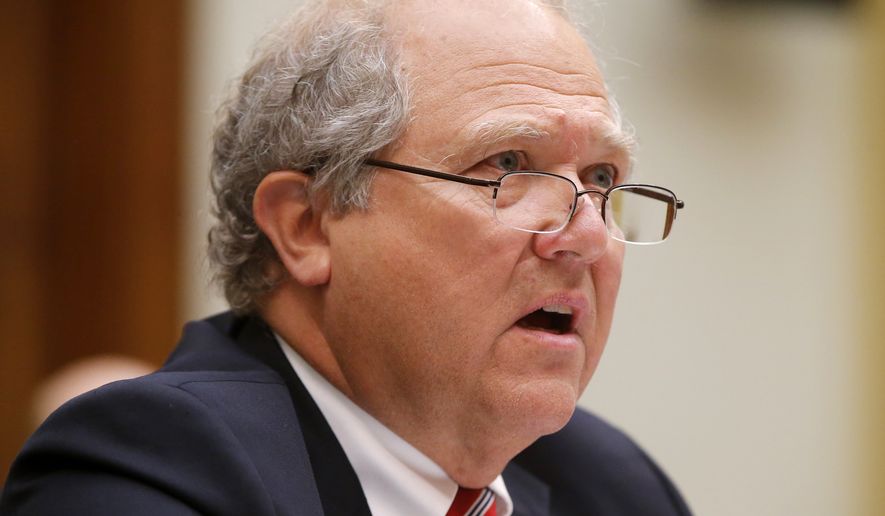The Defense Department spent $43 million on a compressed natural gas fueling station in Afghanistan, while a similar project in Pakistan cost just $300,000 — and now the Pentagon can’t even account for who made the decisions behind the waste, according to an inspector general’s report being released Monday.
John F. Sopko, the inspector general who oversees U.S. spending on Afghanistan reconstruction, called the cost for the green energy project exorbitant and deemed the project ill-conceived.
Just as troubling, he said, was the fact that the Defense Department said because it had shut down the Afghanistan business task force that built the project, it was no longer answering any questions about the decisions it made.
“Frankly, I find it both shocking and incredible that DOD asserts that it no longer has any knowledge about [the task force], an $800 million program that reported directly to the Office of the Secretary of Defense and only shut down a little over six months ago,” Mr. Sopko said in a stern letter to Defense Secretary Ashton Carter.
The waste is being revealed at a time when the Pentagon is about to receive an extra $25 billion in funding for the year, thanks to the debt agreement Congress reached last week.
Defense hawks on Capitol Hill, and the Pentagon itself, have said they cannot operate without a huge infusion of cash.
But the very day the House was voting to approve the deal, a billion-dollar military blimp broke free of its moorings and floated from Maryland to Pennsylvania, dragging cables and tearing down power lines at it roamed, unmanned. It was eventually shot down.
The blimp fiasco left some lawmakers questioning Pentagon spending — particularly since the department’s own watchdog has said the Defense Department has grown so big so quickly that it is impossible to perform a complete audit to certify its finances.
That was evident in the case of the gas station, where the Pentagon couldn’t produce some basic documents, including backup for an assertion to Congress about the success of the program.
In the case of the gas station, the goal was to try to demonstrate to Afghanistan the feasibility of using compressed natural gas, which the country has, rather than relying on imported oil to fuel vehicles.
It was a project of the Task Force for Business and Stability Operations, a Pentagon program designed to try to help the economy recover from Taliban occupation and the American-led war that began in 2001.
But Mr. Sopko said the task force didn’t regularly bother to conduct feasibility studies for its projects, so in the case of the gas station it failed to realize Afghanistan doesn’t have transmission or distribution infrastructure for natural gas, making the project likely a waste from the beginning.
Afghans couldn’t even afford the conversion necessary to make their cars able to run on compressed natural gas, Mr. Sopko said.
The task force plowed ahead anyway, spending $42,718,739 from 2011 through 2014 to build and operate the station, though such projects in Afghanistan should cost only about $200,000.
“To date, DOD has been unable to provide documentation showing why the Sheberghan CNG station cost nearly $43 million,” Mr. Sopko said.
Sen. Chuck Grassley, Iowa Republican, called the gas station project ridiculous but said the Pentagon’s attempt to stymie the investigation and not produce the invoices and payment vouchers made matters even worse.
“If those documents don’t exist, that’s a huge problem,” he said. “The lack of accountability and transparency is disgraceful. The Defense Department needs to come clean, drop the obfuscation and hold people responsible for a colossal waste of tax dollars.”
In its official reply to the inspector general, the Defense Department refused to answer questions about the waste and blamed Congress, saying that once Capitol Hill decided to shut down the program, the people involved have scattered.
Brian P. McKeon, the principal deputy undersecretary, said he offered to try to dig up some records and make them available “with appropriate security safeguards” but that Mr. Sopko never accepted the offer.
Mr. McKeon also said he offered to try to find some of the personnel.
Mr. Sopko said that offer meant the Defense Department would have had final say on what documents were turned over — a situation that he said was unacceptable and contrary to the law.
Mr. Sopko also said he has tried to pry loose the names of people with whom the Pentagon could put his investigators in contact, but the department has repeatedly failed to name anyone.
He indicated that the Pentagon seems particularly intent on protecting the business task force from scrutiny, but Mr. Sopko said he will persevere.
• Stephen Dinan can be reached at sdinan@washingtontimes.com.




Please read our comment policy before commenting.